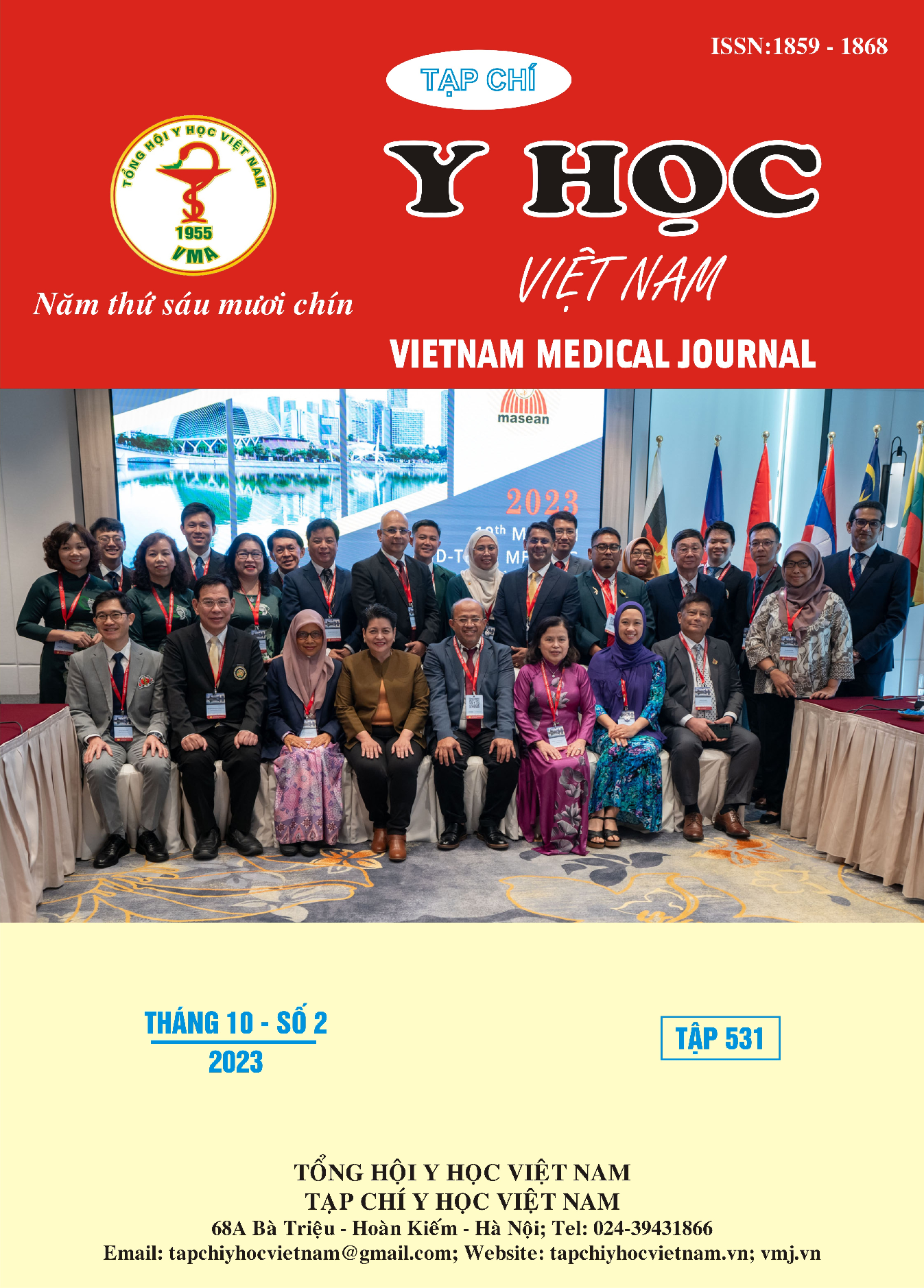EVALUATING THE ASSOCIATION BETWEEN MICROSATELLITE INSTABILITY AND SOME CLINICAL AND SUBCLINICAL FEATURES OF COLORECTAL CANCER
Main Article Content
Abstract
Introduction: Microsatellite instability (MSI) is one of three known molecular pathways of the pathogenesis of colorectal cancer. MSI is a prognostic indicator of colorectal cancer, which has a role in chemotherapy and immunotherapy planning, and contributes to Lynch syndrome screening. There are 3 methods to evaluate MSI status: PCR, IHC and NGS. Objective: Determine the rate of MSI and evaluate the association between MSI and some clinical and subclinical features of colorectal cancer at Hanoi Oncology Hospital. Subjects and methods: 156 patients with colorectal cancer are tested for MSI by IHC, NGS and are evaluated the association with clinical and subclinical features. Results: The rate of colorectal cancer with MSI tested by IHC is 10.9%, and by NGS is 11.5%. The sensitivity and specificity of the MSI test by IHC compared with NGS are 94.4% and 100% respectively. There is an association between MSI and: location, size, histopathological type, differentiation, microscopic invasion of the tumor and lymphocytic infiltration. This association is statistically significant with p < 0.05. There is no association between microsatellite instability and age, gender, lymph node metastasis, and distant metastasis. Conclusion: The rate of MSI testing by IHC is 10.9%, by NGS is 11.5%. The sensitivity and specificity of the MSI test by IHC compared with NGS are 94.4% and 100% respectively. There is an association between MSI and: location, size, histopathological type, differentiation, microscopic invasion of the tumor and lymphocytic infiltration.
Article Details
Keywords
Microsatellite instability, Histopathology, Immunohistochemistry, Next generation sequencing.
References
2. Chu Văn Đ., “Nghiên cứu bộc lộ một số dấu ấn hoá mô miễn dịch và mối liên quan với đặc điểm mô bệnh học trong ung thư biểu mô đại trực tràng”, Thesis, 2021. Truy cập: 12 Tháng Bảy 2023. [Online]. Available at: http://dulieuso.hmu.edu.vn/handle/hmu/1980
3. A. Sasaki và c.s., “Endoscopic Scoring System for T2 Invasion in Colorectal Cancer”, Tech. Innov. Gastrointest. Endosc., vol 24, số p.h 2, tr 121–126, tháng 1 2022, doi: 10.1016/ j.tige.2021.11.005.
4. M. E. C. McFarlane, A. Rhoden, P. R. Fletcher, và R. Carpenter, “Cancer of the colon and rectum in a Jamaican population: diagnostic implications of the changing frequency and subsite distribution”, West Indian Med. J., vol 53, số p.h 3, tr 170–173, tháng 6 2004.
5. D. Klingbiel, Z. Saridaki, A. D. Roth, F. T. Bosman, M. Delorenzi, và S. Tejpar, “Prognosis of stage II and III colon cancer treated with adjuvant 5-fluorouracil or FOLFIRI in relation to microsatellite status: results of the PETACC-3 trial”, Ann. Oncol., vol 26, số p.h 1, tr 126–132, tháng 1 2015, doi: 10.1093/annonc/mdu499.
6. A. Zaanan và c.s., “Defective Mismatch Repair Status as a Prognostic Biomarker of Disease-Free Survival in Stage III Colon Cancer Patients Treated with Adjuvant FOLFOX Chemotherapy”, Clin. Cancer Res., vol 17, số p.h 23, tr 7470–7478, tháng 12 2011, doi: 10.1158/1078-0432.CCR-11-1048.
7. R. Gafa và c.s., “Sporadic colorectal adenocarcinomas with high-frequency microsatellite instability: Pathobiologic features, hMLH1 and hMSH2 expression, and clinical outcome”, Cancer, vol 89, số p.h 10, tr 2025–2037, tháng 11 2000, doi: 10.1002/1097-0142(20001115)89:10<2025::AID-CNCR1>3.0.CO;2-S.
8. O. Suzuki và c.s., “Prevalence and clinicopathologic/molecular characteristics of mismatch repair-deficient colorectal cancer in the under-50-year-old Japanese population”, Surg. Today, vol 47, số p.h 9, tr 1135–1146, tháng 9 2017, doi: 10.1007/s00595-017-1486-x.


